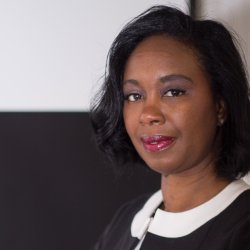LaDios Muhammad is the Executive Assistant at GRID Alternatives Colorado, and a lifelong student of history. She sat down with us one afternoon to reflect on Black History Month, and reveals a hidden figure from the Civil Rights Movement who inspires her to keep persevering.
How did you come to GRID?
After a few years as an administrative assistant at a university, I decided I wanted to do something different. I had always worked in higher education, and the nonprofit world seemed interesting to me. I came across GRID online, and I loved the mission even though I knew nothing about solar. Now here I am, almost two years later.
What do you enjoy most about your role at GRID?
The people that I meet and work with. We have lots of different programming -- whether it’s Solar Spring Break, Solar Academy, or internships -- that bring people from different backgrounds and stories together. It teaches you not to judge a book by its cover. I am also inspired by our work with re-entering citizens, and how solar is opening doors to new careers for people.
What do you think about when you hear "Black History Month"?
When I was growing up, it was a lot more exciting. We used to have celebrations and it helped me feel connected to my roots as a Black American. Over the years, I feel that the meaning of the month and what it stands for has gotten watered down, or even brushed over.
Black History Month is a time to understand who we are as Black Americans, and it starts with knowing our history. There are so many Black hidden figures because so much of our history isn’t taught in schools, and I think it’s important to celebrate how talented we are as a people, and to know that we can go even farther still.
Is there a black person from history and/or from today who inspires you? Why?
Myrlie Evers. Her husband was the late Medgar Evers, an activist who worked with Dr. Martin Luther King Jr. during the Civil Rights Movement. On June 12, 1963, Medgar was assassinated by a white supremacist. Myrlie testified against Medgar’s assassin to an all-white jury. There was no conviction. A second trial also ended with a hung jury.
With no justice for Medgar, Myrlie moved to California and ran for Congress twice. She didn’t win. But she never let those losses stop her. She became the National Director of Community Affairs for ARCO [the Atlantic Richfield Company], where she made huge strides for women’s rights in the 1970’s. In the 1980’s, the mayor of Los Angeles appointed her Commissioner of Public Works. And in the 1990’s, decades after Medgar’s death, Myrlie went back to Mississippi for a third trial where her husband’s assassin was finally convicted in his 70’s.
Myrlie is 85 years old and still in politics. In 2013, she read the invocation at Barack Obama’s second inauguration. I just think she is so amazing because she made sure justice was served, and went on to do great things herself despite all of the adversity she faced. I’m actually playing Myrlie in a show opening in Denver next month, called “Call Me Mrs. Evers”. I’m hoping we can take the show on the road to Los Angeles and perform it for her.
Is there anything else you want to add?
I love that GRID is opening up the conversation about Equity, Inclusion, and Diversity. I get scared when people don’t talk. We want to protect ourselves and hide behind technology, but we can’t make any change that way. Just look at Myrlie Evers: thirty years of pain, without justice, to get to this beautiful, happy ending. She didn’t get there by hiding. We’re still constantly learning things about our past, and the only way we can move forward is to talk and learn from each other. There’s still so much to know.

